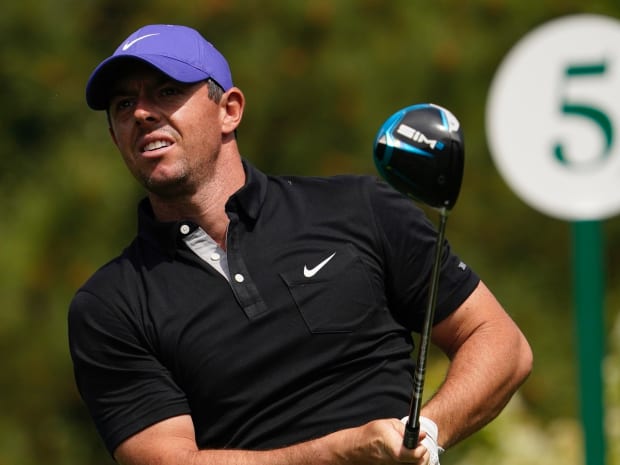McIlroy could complete a career Grand Slam with a win at Augusta this weekend. But he's taking the long view, even if it means sacrificing the 2021 Masters.
You can say that Rory McIlroy gets spooked by the Masters, that he wants to complete the career grand slam so desperately that his brain seems to short circuit, that he would probably win tournaments on an exact replica of Augusta National as long as there was no green jacket on the line, and that’s all fair. This week, it is also irrelevant.
McIlroy shot a first-round 76 Thursday, but this wasn’t about pressure or history. When you watch McIlroy at the Masters this week, you’re not really watching the McIlroy you have watched for years. You’re watching McIlroy in transition.
There have been times in the past year when McIlroy seemed to have no idea where the ball was going. He finally admitted his swing was out of whack, that he got caught up in the speed chase, and he decided to make Pete Cowan his primary teacher. Cowan can help in a lot of ways, but what he could not do is postpone the Masters. And so this week, McIlroy was like an actor in the middle of a costume change when the curtains went up for the second act. He could run away or hope nobody notices he is still buttoning his shirt.
McIlroy knows it, too. That was apparent when he met with the media in Augusta Tuesday. He kept saying he could win the Masters, but he did not say he expected to win the Masters this year. Sure, his official position was that he was here to win. But it was not realistic. He doesn’t trust his swing yet.
“I'm on the range off a flat lie, yeah, perfect, I can do it every time,” he said Thursday. “But then once you get on the golf course and you get these different lies and different shots and different winds, that's the litmus test right there, and it still didn't feel quite 100 percent.”

The most memorable shot of McIlroy’s round hit a spectator: His father Gerry. (“I think he just needs to go and put some ice on—maybe I'll autograph a bag of frozen peas for him,” McIlroy said.) But perhaps the most telling was on the par-5 13th. He found the fairway with his first shot, but still found the creek with his second. The fairway slopes right to left, making the approach challenging.
“More than anything else around here, it's trusting [the swing] on these side slopes and having these balls that are two feet above you,” McIlroy said. “That was sort of what happened on 13.”
It was that kind of day. On the par three sixth, he pulled his tee shot and exhaled deeply. He had missed in the wrong place—short-sided—and he knew it. On No. 9, he hit a great drive and had some swagger. His approach was good. But then he three-putted for bogey.
McIlroy did say “I was encouraged by some of the stuff I saw out there.” It is truly amazing how well great golfers can play when they are still searching. As lost as Jordan Spieth looked in recent years, he managed to make cuts on the toughest tour in the world. McIlroy might not win again all year—just two years after winning the PGA Tour Player of the Year award. But he and Cowan are playing the long game.
“I just thought with what I have been sort of struggling with or trying to find a grasp with my swing, Pete likes to get his students to do what I was trying to feel I was doing,” McIlroy said this week. “It just felt like a comfortable fit for me. That's the reason I brought him in. It's basically just about trying to understand the body movements a little bit more and sort of understanding why certain shots happen and how to fix those on the fly.”
At some point, McIlroy will look like himself again, and then he can resume his pursuit of a green jacket. It would help if he turns his wedge play from a weakness to a strength. But in the meantime, McIlroy started to say what he knew coming in: This week is not really about winning for him: “I mean, my goal is to play well and at least give myself a chance.”
More Masters coverage: